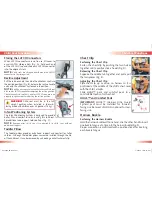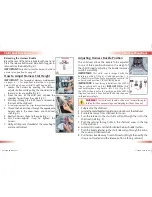
6
7
Important Harness Adjustments
As per the American Academy of Pediatrics:
All infants should ride rear-facing until they have reached at least
1 year of age and weigh at least 20 pounds. That means that if
your infant reaches 20 pounds before her first birthday, she should
remain rear-facing at least until she turns 1 year old. It is best for
children to ride rear-facing to the highest weight or height allowed
by the manufacturer.
Rear-Facing
Weight 5 – 33 pounds (2.3 – 15 kg).
Use rear-facing only with children:
who weigh between 5 and 33 lbs. (2.3 – 15 kg.)
and
the top of the child’s head is 1” (2.5 cm.) or more
below the top of the child seat (Fig. A)
and
the harness straps are in the nearest slots at or
below the child’s shoulders.
If the child cannot be secured within these requirements because
the child exceeds height or weight requirements, review the
forward-facing guidelines on page 7.
If the child cannot be secured within these requirements because
the child is too small, selection of a different child seat (such as an
infant carrier) may be required.
IMPORTANT:
See How to Adjust Harness Slot Height on page 32.
•
•
•
Safety Information
WARNING!
Do NOT use the child seat rear-facing if:
the child is less than 5 lbs. (2.3 kg.) in weight
or
the child exceeds 33 lbs. (15 kg.) in weight
or
the top of the head is less than 1” (2.5 cm.) from the top of the child
seat (Fig. A)
or
the harness straps are in a slot above the child’s shoulders.
•
•
•
•
WARNING!
Do NOT use the child seat forward-facing if:
the child is less than one year of age
or
the child is less than 20 lbs. (9.1 kg.) in weight
or
the child exceeds 65 lbs. (29.5 kg.) in weight
or
the child exceeds 49” (124.5 cm) in height
or
the top of the ears are above the top of the child seat
or
the top harness slots fall below the child’s shoulders, parallel to level
ground (Fig. B)
•
•
•
•
•
•
1 inch
(2.5 cm
)
A
Forward-Facing
Weight 20 pounds (and 1 year) – 65 pounds (9.1 – 29.5 kg.)
Use forward-facing only with children:
who are at least one year of age
and
who weigh between 20 and 65 lbs. (9.1 – 29.5 kg.)
and
49” (124.5 cm) or less in height
and
the top of the child’s ears are below the top of the child seat
and
the harness straps are in the nearest slots at or above the child’s shoulders,
parallel to level ground (Fig. B).
IMPORTANT:
See How to Adjust Harness Slot Height on page 32.
IMPORTANT:
When using forward-facing recline mode, it may become
necessary to adjust the harness to the next higher set of slots than would
be used when the seat is upright. See figure B for reference.
•
•
•
•
•
Shoulder level
Above Shoulder Level
Below Shoulder Level
Upright
Reclined
Forward-Facing
B
Safety Information
P276000_R2.indd 6-7
1/2/2008 10:15:51 AM


































